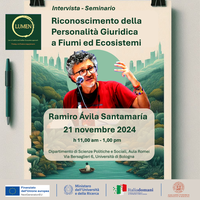Rights of Nature and Constitutional Justice: A Dialogue with Prof. Ramiro Ávila Santamaría
An exclusive interview on Ecuador, Buen Vivir, and the role of courts in environmental protection. The full discussion with the renowned jurist and scholar will be available online soon.
Published on 26 November 2024 | Guest articles

By Amilcare D’Andrea and Valentina Capuozzo, Post-Doctoral Research Fellows at UNIBO
At the Department of Political and Social Sciences of the University of Bologna, we had the honor of interviewing Prof. Ramiro Ávila Santamaría, professor at the Andean University Simón Bolívar and former judge of the Constitutional Court of Ecuador, as part of the LUMEN project. During the seminar-interview held on November 21, we explored key topics related to the rights of nature, social justice, and an ecosystem-based approach to law.
Among the issues addressed, we discussed potential constitutional reforms to strengthen the protection of natural resources, respect the autonomy of indigenous communities, and promote genuine popular participation. Special attention was given to the case of Yasuní National Park and the challenges posed by the lack of adherence to the consulta popular in Ecuador, highlighting the contradictions of democracies and the tensions between extractivist models and the principles of Buen Vivir.
Another central theme of the interview was the expanding role of courts in environmental protection. Starting from the landmark T-622 ruling of the Colombian Constitutional Court, which recognized biocultural and Nature’s rights, we debated whether courts are replacing or collaborating with policymakers in guiding climate and environmental action.
Finally, we reflected further on Ecuador, particularly during the Correa era, and the challenges of legislative reforms. Prof. Santamaría outlined the anti-capitalist social and cultural foundation that characterizes the cosmology of Buen Vivir. He offered a critical perspective on the socio-economic outcomes achieved in Ecuador during Correa’s government, also emphasizing the limits faced in implementing crucial reforms such as food sovereignty, ecological transition, and democratic participation. We delved into how these initiatives could have been integrated into a broader strategy of wealth redistribution.
The interview was a unique opportunity to reflect on how justice, nature, politics, culture, and society can converge to construct a more ecocentric legal system. The full interview will soon be available on the LUMEN project website.
Don’t miss the complete interview to uncover Prof. Santamaría’s invaluable insights!
Album




